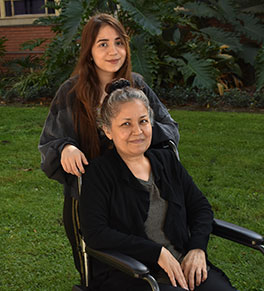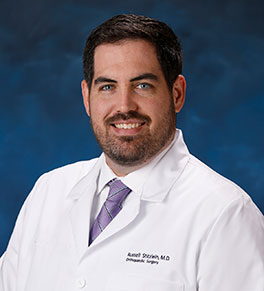Restoring a breast cancer patient’s hope, mobility

A UCI Health orthopaedic oncologist gave the gift of hope to 50-year-old Maria Oceguera after performing reconstructive surgery to enable her to walk again — a procedure she’d been told wasn’t done by anyone in the United States.
Oceguera’s story began when she suffered a fall in her Texas home. Providers at an urgent care facility there alerted her to an illness that soon would be diagnosed as metastatic breast cancer.
She came to stay with her sister in Riverside, Calif., and eventually was treated at a community hospital for a hip fracture that kept her bedbound and in severe pain.
An orthopaedic surgeon there told her the cancer had spread to her hip bones, causing so much damage that she wasn’t a candidate for a hip replacement, that nothing more could be done.
‘My hope just disappeared’
“I felt bad, really bad,” Oceguera recalls. “My hope just disappeared.”
After a call to her son back in Texas, she realized she had no choice but to fire her doctor and find another who would fight for her.
Her new doctor reached out to UCI Health orthopaedic oncologist Dr. Russell N. Stitzlein, chief of orthopaedic oncology at the UCI Health Chao Family Comprehensive Cancer Center, who assessed her case and felt certain he could help.
For Stitzlein, the only orthopaedic oncology surgeon in Orange County affiliated with a National Cancer Institute-designated cancer center, Oceguera’s reconstructive surgery in August 2020 was straightforward.
Walking the day after surgery
“This specialized surgery only took two hours and 15 minutes, which is not much longer than a hip replacement,” he says.
“In her case, Maria was able to get up and walk the next day for the first time in several weeks.”
A standard hip replacement wasn’t possible because an aggressive tumor from Oceguera’s spreading cancer had destroyed the top of her leg bone, or femur, including the head that forms the ball of the hip joint.
With too little strong bone to support a hip replacement, he instead built up her damaged femur.
“I was able to offer her a proximal femur replacement with endoprosthetic reconstruction,” says Stitzlein, who is also an assistant professor in the UCI School of Medicine’s Department of Orthopaedic Surgery.
“I replaced the damaged bone with metal and reattached muscles and tendons.”
Improving quality of life
Stitzlein performs some 200 of these limb-salvage surgeries each year at UCI Medical Center in Orange.
“Surgery can improve quality of life and help cure disease,” he says. “Maria went from being bedridden, which could have led to pneumonia or some other infection, to being able to get around. That greatly improves her quality of life.”
Oceguera’s story is not all that uncommon with a diagnosis of cancer, Stitzlein explains.
“It can be a lot for patients to take in when first given such a grave diagnosis,” he says.
“But at UCI Health, we have all the specialists in one place to handle everything, from the most basic cases to the most complex. This surgery is a great example of what we can do to help people.”
‘They’re real heroes’
After the surgery, Oceguera says, “It was like a miracle. The pain was gone.”
“He’s my angel,” she says of Stitzlein.
About the entire care team, she says: “They’re real heroes. I feel very grateful to them.”
Today, Oceguera can stand, move her legs and walk to the bathroom with the aid of a walker. She uses a wheelchair to cover longer distances, such as when she comes to UCI Health for breast cancer treatment.
Sometimes, she admits, “My hip is a little painful, but not as painful as it was before.”





